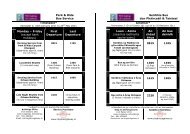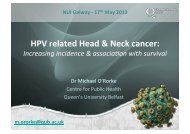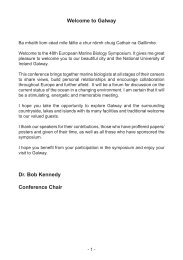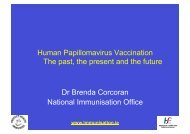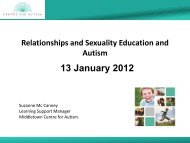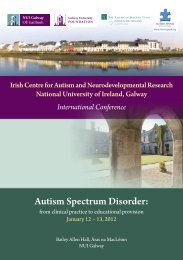International Center Board of Directors Dear Service ... - Conference.ie
International Center Board of Directors Dear Service ... - Conference.ie
International Center Board of Directors Dear Service ... - Conference.ie
You also want an ePaper? Increase the reach of your titles
YUMPU automatically turns print PDFs into web optimized ePapers that Google loves.
The Global Classroom: Digital Technology as a Tool<br />
for Global Understanding and <strong>Service</strong>-Learning<br />
Presenter:<br />
Kenneth Carano, University <strong>of</strong> South Florida<br />
The digital era has enabled educators the opportunity <strong>of</strong><br />
accessing information across nations and cultures. This<br />
session discusses the implementation <strong>of</strong> an online course<br />
focusing on global perspectives. As a result <strong>of</strong> breaking the<br />
confinement <strong>of</strong> the four walls <strong>of</strong> the traditional classroom,<br />
students will consult with people and access materials<br />
globally, rev<strong>ie</strong>w changing perspectives they are developing<br />
and be provided service-learning opportunit<strong>ie</strong>s across the<br />
world, regardless <strong>of</strong> the classroom locale.<br />
Can Mindfulness Deepen Critical Reflection?<br />
The Use <strong>of</strong> Contemplative Tools to Foster Learning<br />
Presenter:<br />
Vanessa-Jean Merckel, University <strong>of</strong> Johannesburg,<br />
Johannesburg, ZA<br />
I plan to explore conceptually whether “mindfulness”<br />
practices could assist service-learning students to deepen<br />
their reflective skills to enhance learning. Recent theor<strong>ie</strong>s<br />
acknowledge that learning is more than just a cognitive<br />
enterprise (Merriam, Cafferella, & Baumgartner, 2006)<br />
and involves the “whole” student – body, mind, and spirit.<br />
Drawing on the work <strong>of</strong> Kabott-Zinn (1994) and Ng<br />
(2005), I bel<strong>ie</strong>ve that utilising somatic awareness could<br />
increase students’ ability to v<strong>ie</strong>w and critique their worlds<br />
more meaningfully.<br />
An Education that Matters:<br />
The Amigos Club Exper<strong>ie</strong>nce<br />
Presenters:<br />
Glenda W. Crawford, Elon University, Elon, NC, US<br />
April Post, Elon University, Elon, NC, US<br />
The Amigos Club is an academic service-learning<br />
initiative that builds social relationships among teacher<br />
education majors, Spanish conversation students, and<br />
adolescent English language learners (ELL) and famil<strong>ie</strong>s.<br />
University students use ethnographic inquiry, digital<br />
storytelling, and reflective journaling to gain understanding<br />
<strong>of</strong> diverse cultures. Faculty research measures the impact<br />
<strong>of</strong> university students’ personal efficacy in building crosscultural<br />
relationships, civic responsibility in solving<br />
problems <strong>of</strong> cultural disenfranchisement, and academic<br />
knowledge in understanding critical issues <strong>of</strong> social<br />
democracy.<br />
Panel # 2<br />
Location: Room AM 200 (Fottrel)<br />
A Comparative Examination <strong>of</strong> Outcomes<br />
Associated with <strong>Service</strong>-Learning in Domestic and<br />
<strong>International</strong> Contexts<br />
Presenter;<br />
Kari Knutson-Miller, California State University, Fullerton, CA<br />
This presentation examines outcomes associated with<br />
service learning in domestic and international contexts.<br />
Multiple groups <strong>of</strong> upper-division undergraduate level<br />
pre-service teachers participated in service-learning<br />
exper<strong>ie</strong>nces in either domestic (Orange County, CA)<br />
or international (China) settings. Outcomes including<br />
mastery and understanding <strong>of</strong> course learning goals,<br />
cultural competenc<strong>ie</strong>s, civic engagement, and career goal<br />
clarification were considered. Group differences were found<br />
in both quantitative and qualitative analyses <strong>of</strong> participant<br />
outcomes.<br />
Rurality: A Sense <strong>of</strong> Place and Identity<br />
for Student Teachers<br />
Presenter:<br />
Jane Pennefather, University <strong>of</strong> KwaZulu-Natal,<br />
P<strong>ie</strong>termaritxburg, ZA<br />
In considering the social formation <strong>of</strong> identit<strong>ie</strong>s, this paper<br />
explores the implications <strong>of</strong> placing student teachers in<br />
a deeply rural South African context. The session will<br />
examine the concept <strong>of</strong> rurality as a context/a sense <strong>of</strong><br />
place and the importance for Teacher Education to create<br />
service-learning opportunit<strong>ie</strong>s to challenge defic<strong>ie</strong>ncy<br />
discourses <strong>of</strong>ten associated with rural contexts in South<br />
Africa. Drawing from the work <strong>of</strong> Wenger, E (1998), the<br />
presenter will attempt to illustrate the connection between<br />
identity and practice.<br />
Preparing Elementary Teacher Candidates to Utilize<br />
<strong>Service</strong>-Learning as Pedagogy<br />
Presenter:<br />
Kathleen Wasserman, University <strong>of</strong> Scranton, PA, US<br />
This project describes how one university is purposefully<br />
educating its teacher candidates to v<strong>ie</strong>w service-learning as<br />
a meaningful pedagogy for increasing student motivation<br />
and learning. Freshman, sophomore, and junior-level<br />
service-learning requirements will be br<strong>ie</strong>fly described.<br />
Research findings evaluating how seniors choose to<br />
implement service-learning into their student teaching<br />
exper<strong>ie</strong>nces will be explored.<br />
16



